In Japanese, oneesan お姉さん means "older sister," and sometimes refers to a young girl. It's also romanized onēsan, with a macron for the long vowel.
The younger counterpart is imouto 妹, "young sister." The male counterparts are oniisan お兄さん and otouto 弟, "older brother" and "younger brother," respectively.
Kanji
The word oneesan is normally written with kanji, as お姉さん.
The kanji of oneesan means "older sister," ane 姉.
Sometimes, oneesan is spelled with hiragana instead, as おねえさん, or おねーさん, specially if it's a small child saying it, due to aesthetics.
Variants
With family words in o__san お〇〇さん pattern, the o~ お~ prefix can be removed, and the honorific suffix can be changed between ~san ~さん, ~chan ~ちゃん, and ~sama ~さま.
The affixes o~ and ~sama can be spelled with kanji for added formality. This rarely happens, however.
| o~ Default. |
∅ Relaxed. |
|
|---|---|---|
| ~sama Respectful. Distant. Formal. |
oneesama お姉さま おねえさま おねーさま お姉様 御姉様 |
neesama 姉さま ねえさま ねーさま 姉様 |
| ~san Default. |
oneesan お姉さん おねえさん おねーさん |
neesan 姉さん ねえさん ねーさん |
| ~chan Chummier. Diminutive. |
oneechan お姉ちゃん おねえちゃん おねーちゃん |
neechan 姉ちゃん ねえちゃん ねーちゃん |
| ∅ Relaxed. |
onee お姉 おねえ おねー |
nee 姉 ねえ ねー |
Beware: the word onee オネエ spelled with katakana is an LGBT slang.
See onee-kotoba オネエ言葉 for details.
Meaning
The word oneesan means "older sister," "elder sister," in the sense of someone who is your sister, and who is older than you.
It doesn't mean "oldest sister." If you have two older sisters, they're both oneesan for you.
- {ichiban ue no} oneesan
一番上のお姉さん
The older sister [that] {is most above}. (literally.)
The oldest older sister. - choushi
長姉
Eldest sister.- nagai
長い
Long. (distance, time.)
- nagai
- choujo
長女
Eldest daughter [of a family].
The word oneesan is sometimes translated to English as "big sister," or oneechan as a chummier "big sis." The size of your sister has nothing to do with word. Your oneesan can be smaller than you.
- {ooki na} oneesan
大きなお姉さん
A {big} oneesan.
Toward Young Women
In Japanese, some family words can be used to refer to random people whom aren't actually related to you. The word oneesan can refer to a random "young woman."
This is similar to how "granny" and "grandpa" can refer to random elders in English, except that Japanese has words for other ages, too.
| Age | Male | Female |
|---|---|---|
| Elder | ojiisan おじいさん Grandfather. Old man. Grandpa. |
obaasan おばあさん Grandmother. Old lady. Grandma. Granny. |
| Old adult. | ojisan おじさん Uncle. Old man. |
obasan おばさん Auntie. Old lady. |
| Young adult. Older teen. |
oniisan お兄さん Older brother. Mister. |
oneesan お姉さん Older sister. Miss. Young lady. |
| Children. | bocchan 坊ちゃん The master's son. (used by servants.) Someone else's son. Pampered boy. Rich boy. |
ojousan お嬢さん Daughter. Missy. Young lady. Rich girl. |
An adult woman can be called both ojousan and oneesan, specially if the speaker is someone older.
The diminutive variants, ojouchan and oneechan, can sound patronizing or intimate, e.g. if you have a character who is a drunk creep hitting on a girl, he's probably going to call her oneechan. Such cases tend to be translated as "missy."
- Context: Jahy-sama works as a waitress.
- oneechan, kocchi mo nama-chuu futatsu ne
おねーちゃん こっちも生中2つね
Missy, two beers here, too.- nama-chuu - from nama-biiru 生ビール, "raw beer," as in "draft beer," in a a jug of "medium," chuu 中, size.
- gaya gaya
ガヤガヤ
*noisy crowd.* - oneechan!? ki-yasuku yobi-otte! ware wo dare da to omotte-iru
おねーちゃん!?気やすく呼びおって!我を誰だとおもっている
Missy?! Calling [me] so casually! Who does [he] think I am?- ki-yasui - relaxed, familiar, casual, as opposed to formal.
- yobi-otte - te-form of yobi-oru 呼びおる.
- ~oru suffixed to the ren'youkei 連用形 of a verb works similarly to ~yagaru ~やがる, used to say someone "dares" to do something to you, expressing angers or amazement.
- nama-chuu futatsu na
生中2つな
Two beers, right? - pi, pi
ピピ
*writing down.* - ware wa makai nanbaa tsuu no Jahii-sa...
我は魔界No.2のジャヒーさ・・・
I['m] the demon world's number two, Jahy-sa...
- Here, Jahy was about to call herself Jahy-sama. You don't normally use honorific suffixes toward yourself, specially the respectful ~sama ~様, as it sounds pompous. This is typically done by characters that are extremely proud, over-confident, or bossy.
- nanbaa tsuu, the katakanization of "number two," was used as furigana for its abbreviation.
- neechan, kocchi mo~
ねーちゃんこっちもー
Missy, here too~ - a'!? hai!
あっ!?はい!
Ah? [One second]!- hai - "yes," used as an affirmative response in general.
In anime, it's typical for a high school girl character to get called oneesan by some random little kid. It makes sense to think of this like this: if the kid had an older sister, she would be around the same age as that girl, so the girl is like an oneesan (in age) for the kid.
- Context: a random boy compliments a random unrelated older girl.
- atama φ ii!!
頭いい!!
[Wow, you're so] smart!! - oneechan φ tensai!?
お姉ちゃん天才!?
[Are you] a genius, big sis!? - fufu......
ふふ・・・・・・
*chuckle* - maa ne
まぁね
[Sort of].
[I guess.]
- Context: a "platelet," kesshouban 血小板, drawn as a cute anime girl, referring to other cells.
- a', {hakkekkyuu no} oniisan ita yo!
あっ 白血球のお兄さんいたよ!
Ah, big brother {white blood cell} [is over there]!
- a', {sekkekkyuu no} oneechan!
あっ 赤血球のおねーちゃん!
Ah, big sis {red blood cell}!
As First Person Pronoun
Like many family words, oneesan can be used as a first person pronoun by an "older sister" talking to her younger sibling, including in the non-family sense.
If a girl uses oneesan to refer to herself when talking to a child, it teaches them to call the girl oneesan. By the same logic, due to family referring to a child by the child's name, children end up using their own name as first pronoun pronoun to refer to themselves.
- Context: upon returning home with Ayase Fuuka 綾瀬風香: Yotsuba finds a note from his father saying that he went to the store and that she should take care of the house while he's away. Learning this, Fuuka says:
- yoshi!
よし!
Alright! - jaa oneechan mo {issho ni} rusuban shite-ageyou
じゃあお姉ちゃんも一緒に留守番してあげよう
Then [I]'ll [stay here] {together [with you]}..- Fuuka and Yotsuba aren't related. Nevertheless, Fuuka calls herself oneechan when talking to Yotsuba, projecting the idea that: for Yotsuba, Fuuka would be an oneesan.
- rusuban - "stay-at-home duty," in the sense of someone leaving home, and someone else staying there to take care of the house.
- ~te-ageyou - volitional form of ~te-ageru ~てあげる, [to do something] for [someone else]."
- pon
ぽん
*head pat* - honto ka!?
ホントか!?
Really?- honto - same hontou 本当, with long vowel shortened.
- honto - same hontou 本当, with long vowel shortened.
Honorific
The word oneesan can be used as a honorific suffix after someone's name. Doing this calls the person an oneesan.
- Context: a young boy asks a squid girl for help with his studies.
- jaa Ika-neechan, boku ni sansuu oshiete yo!
じゃあイカ姉ちゃん ボクに算数教えてよ!
Then, big sis Ika, teach me arithmetic!- neechan - older sister, may also be used toward young women whom one's not related to, specially used by children toward any girl older than them.
- See laughter lines and realization mark for the symbols over the characters' heads.
- betsu ni ii degeso yo
別にいいでゲソよ
[I don't mind doing it].
vs. Ane
The difference between oneesan and ane 姉, which also means "older sister," and has the same kanji but they're read differently, is that oneesan has honorifics, but ane does not.
Since you don't use honorifics toward yourself, when talking to other people about your family, you use ane 姉 to refer to your older sister, and oneesan お姉さん to refer to their older sister.
However, when talking to your own family, oneesan refers to your own older sister.
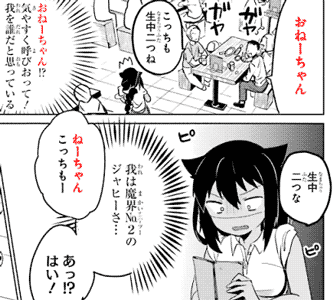
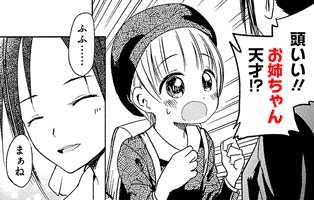
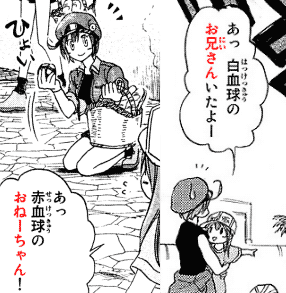
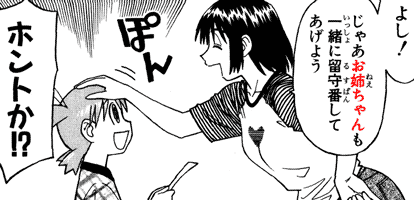
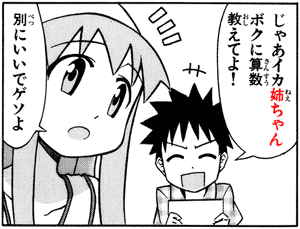
No comments: